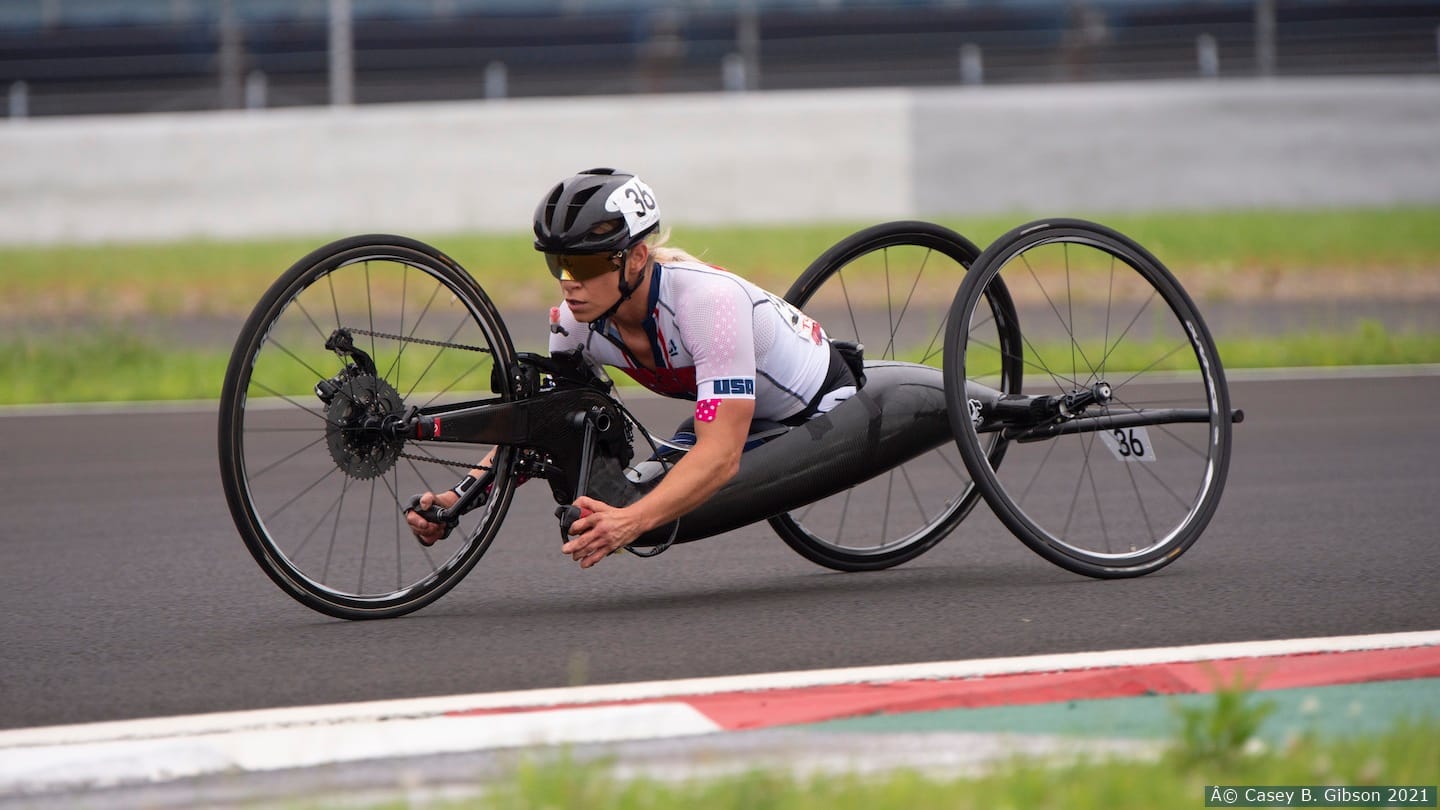
Tokyo Success Was Just A Sliver In Time For The Always-Moving Oksana Masters
by Alex Abrams

Oksana Masters competes in the WH5 road race at the Tokyo Paralympics. (Photo: Casey Gibson)
Oksana Masters spent maybe four hours at home after returning from the Paralympic Games Tokyo 2020 with two gold medals in cycling.
As much as she could’ve used a few days off, she didn’t have the time to sleep all day, binge-watch a TV show or simply do nothing.
Masters had to travel immediately to Michigan to get her sit ski fixed, so she could leave soon afterward for a Para Nordic skiing training camp in Oberhof, Germany.
By now, Masters, a 10-time medalist at the Summer and Winter Paralympics, knows how to make the transition from Para-cycling in the summer to Para Nordic skiing in the winter and then back again.
She’s familiar with the routine and the toll it takes on her body. However, she admitted the transition between the two sports has been more difficult than usual over the past few weeks.
For starters, Masters is preparing to compete in the Beijing Winter Paralympics in March, a little more than six months after her historic run in Tokyo. Usually there is more than a year between Summer and Winter Games.
As if that weren’t enough, the five-time Paralympian fell behind in her training because of a health scare in the spring. She had a large tumor removed from one of her legs 100 days before the start of the Tokyo Paralympics.
“It has been a little bit rocky, but it has been so good to get back on snow,” Masters said. “My transition is a little bit different from the past when I’ve transitioned from summer to winter only because I had an unexpected health (issue) leading into Tokyo, which took a lot of time out of the gym for me.
“And so I’m kind of playing catch-up on skiing and also strength.”
Since returning from Tokyo, Masters has focused on making the switch from racing on paved roads to moving around on snow. It’s not the easiest transition, even though both cycling and Nordic skiing are considered endurance sports.
Masters said she has been training twice and sometimes three times a day to get ready for Beijing, where she’ll again be considered a gold-medal contender. She won two golds and five total medals at the 2018 PyeongChang Winter Paralympics.
Masters has made jumping from one sport to another look easy.
On Aug. 30, in Tokyo, she became the sixth American to earn a gold medal in both the Summer and Winter Paralympics when she won the women’s road cycling time trial in the H4-5 classification with a time of 45:40.05.
Masters followed it up the next day by pulling away from China’s Sun Bianbian to win the women’s road race in 2:23.39 for her second gold medal of the Tokyo Paralympics.
However, Masters revealed she was facing a serious health issue in the months leading up to the Tokyo Paralympics. She told ESPN.com that an MRI revealed a large tumor in one of her legs was causing her incredible pain. The pain was so bad she said she couldn’t “do everyday things,” such as sleeping.
Masters said her only option was to have surgery if she wanted to compete in Tokyo and at other Paralympics.
“I've never felt pain like this before and that was absolutely terrifying, and the only option was surgery,” Masters told ESPN.com. “I had to have a heart-to-heart conversation with myself in the mirror and be like, ‘You got to keep your body together.’ It felt like déjà vu from when I was younger and had to get surgeries.”
Masters is now back to training 1.5-3 hours on snow in the morning as a member of the U.S. Paralympics Nordic Skiing national team. She then works out in the gym or does more skiing after lunch.
Several of her teammates on the U.S. Paralympics Nordic Skiing national team are also multi-sport athletes who’ve competed in the Summer and Winter Paralympics.
Masters’ boyfriend, Aaron Pike, is a five-time Paralympian who competes in both the marathon and Nordic skiing. Meanwhile, Dani Aravich is attempting to qualify for the Beijing Winter Paralympics after making her Paralympic debut as a sprinter in Tokyo.
“My advice for Dani would be to just soak it in and just be in the moment of the experience. This is your first time transitioning from summer to winter, and it’s not a smooth process,” said Masters, who actually made her Paralympic debut in a third sport, winning a bronze medal as a rower in 2012. “Even though social media makes it seem like it’s really cool doing all this, it’s going to be painful.
“But also don’t discredit the work that you did in the summer sport because I’m a firm believer of trying everything once, and you do learn something.”
Masters said she wishes someone would have told her early in her career as a multi-sport star that “there’s no perfect timeline” when it comes to training.
“There’s always going to be athletes who are going to be able to just excel, and it looks like it’s so easy for them,” Masters said. “And for you, you might have to go up and down, up and down and take five steps back before you can actually get up there.
“And it’s totally OK to just be in that moment of your process. There’s no perfect timeline as long as you keep working towards what you love and what your goal is.”
Alex Abrams has written about Olympic sports for more than 15 years, including as a reporter for major newspapers in Florida, Arkansas and Oklahoma. He is a freelance contributor to USParaCycling.org on behalf of Red Line Editorial, Inc.